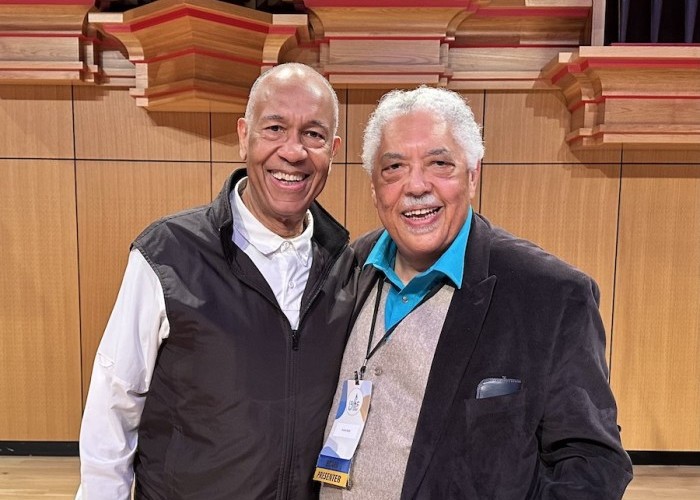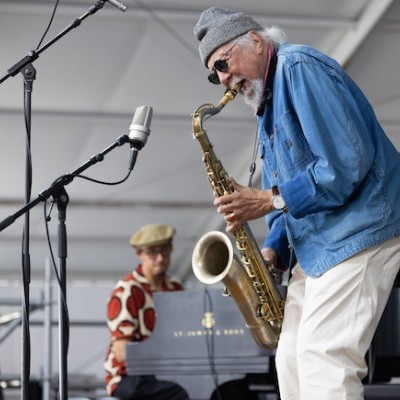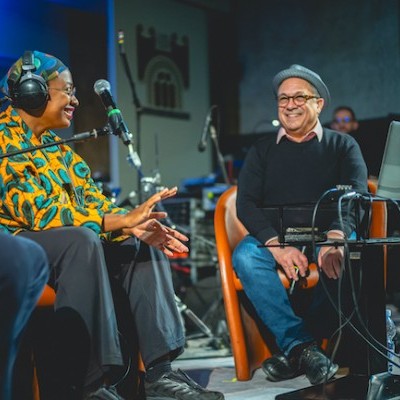Jul 9, 2024 11:35 AM
Trumpeter, Educator Jim Rotondi Dies at 61
Jim Rotondi, a renowned hard-bop trumpeter, composer and educator, died suddenly on July 7 at a hospital in France. He…

“I figured you’d get this one,” laughed John Clayton, left, after Rufus Reid guessed Billy Childs. “This one’s a little soft pitch.”
(Photo: Frank Alkyer)When the International Society of Jazz Arrangers and Composers symposium hit Nashville in May, one of the most anticipated sessions of the weekend happened to be a live Blindfold Test where bassist/composer Rufus Reid and bassist/composer John Clayton gave each other the test, only the second time that two artists have Blindfolded each other. The first? At the ISJAC symposium in Texas two years prior, where Ryan Truesdell and Jim McNeely engaged in a historic “Double Blindfold” published in two parts in DownBeat (November 2022 and December 2022 issues). Rufus and John pondered, chatted, giggled and seemed to take a degree of glee in stumping each other in a lively event attended by a room full of composers and arrangers. It was a glorious insiders’ listening (and guessing) session. The test started with Rufus presenting his first tune for John.
Ahmad Jamal
“Wave” (The Awakening, Impulse, 1970) Jamal, piano; Jamil Nasser, bass; Frank Gant, drums.
John: I think it’s Ahmad Jamal.
Rufus: Yeeees. That’s the easy one! [laughter]
John: The bass sound of the recording makes me think it’s John Heard. Couldn’t tell the vocabulary. The drummer was using those kind of bamboo sticks. I couldn’t hear any of his telltale giveaways. An educated guess is that it might be, I’m going to say Lewis Nash, but I’m at a loss.
Rufus: I’m so happy to hear that. [laughter] Actually, it’s Jamil Nasser and Frank Gant. It’s from an album called Awakening and I had to go buy another LP because I wore it out. It’s a trio that was doing so many different kinds of things. Jamil Nassar was very kind to me the first time I heard him play. He said, “You need to go to New York.” And I said, “I may go there one day … .” And he said, “You know there’s a big barrell and it’s full, fresh from the cow, but the cream always goes to the top no matter how big the vat is.” It gave me the impetus to keep going.
John: I had a chance to play with Frank Gant, but on my wish list, which I was never able to check off, was Ahmad Jamal.
Rufus: Me, too.
John: I knew him, but I never had a chance to play with him. Sonny Rollins was also on that list; he’s not playing anymore. Ahmad Jamal!
Count Basie
“Counter Block” (Breakfast Dance And BBQ, Roulette, 1959) Thad Jones, arranger and composer.
Rufus: Ah, wow. Is that Magic?
John: No.
Rufus: The Chief?
John: [nods]
Rufus: Count Basie.
John: So, who do you think wrote the composition and arrangement?
Rufus: Frank Wess.
John: Close. It was one of your former employers. [laughter]
Rufus: Well, Frank Wess.
John: One more. [laughter]
Rufus: Thad. [crowd applauds]
John: That piece is called “Counter Block,” and I think it might be one of the first compositions and arrangements of Thad’s that gave a preview of where he was going with his own band. And, as you know, you were so blessed to play with Thad Jones and hearing all these colors.
Rufus: What was interesting, I was close with Frank Wess and Frank Foster as well. I knew Thad was in the band at one point. Of course, I always heard the story that Thad, he extended the band a little more than the Chief wanted it to be extended. [laughter]
John: I understand that this was one of the songs that extended the band in a way that even Basie liked.
Bobby Hutcherson
“My Joy” (Oblique, Blue Note, 1979, recorded in 1967) Bobby Hutcherson, vibes; Herbie Hancock, piano; Albert Stinson, bass, Joe Chambers, drums.
John: Whew! OK, educated guesses. I heard some chops in there that reminded me of Eddie Gomez. And because of that, the vibes could be Gary Burton. I don’t think it was Bobby Hutcherson.
Rufus: It was Bobby.
John: It was Bobby?
Rufus: [devilish smile]
John: I knew it was Bobby! [audience busts out laughing] So, if it’s Bobby, then not Eddie Gomez.
Rufus: No.
John: But who had that dark bottom sound like that and those kind of chops? I’d say Richard Davis, but it was almost too tame at the end to be Richard.
Rufus: True.
John: Scott LaFaro?
Rufus: No. [pauses and smiles] It’s a bit unfair. [laughter]
John: That’s not surprising! [audience howls]
Rufus: Albert Stinson.
John: I never heard of Albert Stinson.
Rufus: Well, unfortunately, he died really too young. He and Bobby, they had too much fun with the drugs. And Bobby lived many years after that, but Albert didn’t. And it’s tragic because he did some recordings with [pauses to remember; an audience member calls out Claire Fischer’s name] Claire Fischer.
Billy Childs
“The Path Among The Trees” (Autumn: In Moving Pictures, ArtistShare, 2010) Childs, composer.
Rufus: [almost immediately] I love this tune. Billy Childs. I saw this band live in New York with harp, string quartet, acoustic guitar and saxophone. Amazing. Billy Childs. Check it out.
John: I figured you’d get this one. This one’s a little soft pitch. [laughter] DB
The “Blindfold Test” is a listening test that challenges the featured artist to discuss and identify the music and musicians who performed on selected recordings. The artist is then asked to rate each tune using a 5-star system. No information is given to the artist prior to the test.

Jim Rotondi was acclaimed for his wide, round trumpet tone, remarkable virtuosity and assured swing.
Jul 9, 2024 11:35 AM
Jim Rotondi, a renowned hard-bop trumpeter, composer and educator, died suddenly on July 7 at a hospital in France. He…

Charles Lloyd, seen here at the 2024 New Orleans Jazz & Heritage Festival, makes DownBeat Poll history!
Jul 11, 2024 12:23 PM
The incomparable Charles Lloyd swept the 72nd Annual DownBeat Critics Poll, becoming the first artist ever to earn…

“Being president of Blue Note has been one of the coolest things that ever happened to me,” Was said. “It’s a gas to serve as one of the caretakers of that legacy.”
Jun 4, 2024 12:21 PM
Sitting with Don Was is a comfortable and unhurried exercise. He may seem slightly reserved at first, but ideas and…

The Century Room in downtown Tucson, Arizona, was born in 2021.
May 21, 2024 12:58 PM
Players got to play. It’s long been a part of jazz history: When there’s a venue vacuum, when there are fewer…

“She reminds me of my childhood and makes we want to cry,” Cécile McLorin Salvant, pictured here with writer Ashley Kahn, said of Dianne Reeves.
Jun 11, 2024 12:31 PM
Italy’s Umbria Jazz Winter is one of those rare annual festivals that not only coincides with a major holiday —…